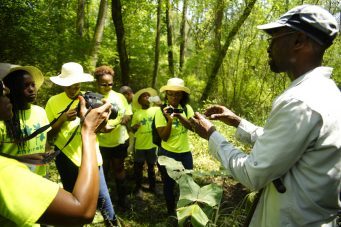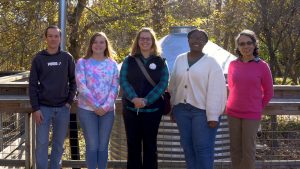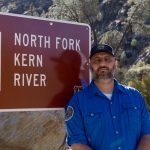Amin Davis
Raleigh, North Carolina
This interview was conducted by Carly Schmidt on December 13, 2021.
Transcript

Amin Davis leading an education tour at Walnut Creek Wetland Park.
What made you want to join PEJ as a board member four years ago?
I had been on the periphery of PEJ since I was a graduate student at NC State in the mid-’90s. A professor told me about the environmental injustices happening in the Rochester Heights community and what PEJ was doing to combat them. Back then, PEJ’s vision was to create an urban wetlands destination park, which was constructed in 2009. A former board member, Ross Andrews, invited me to lead stream cleanups in the area in 2001. I helped with those efforts for years until I started attending meetings in 2016.
You recently worked with Hannah Mico, River Network’s Community Organizing Associate, to support the launch of the Raleigh Watershed Learning Network and engage in some organizational development. What drove you to reach out for support?
We knew about River Network because of our former Program Director. In 2020, we applied for a grant to launch the Raleigh Watershed Learning Network, which has since been renamed the Walnut Creek Watershed Learning Network. [PEJ] has grown a lot over the last couple of years, and we felt the need to do some capacity building and hire an organization to help us identify our weaknesses and fortify our strengths. We received some grant funding and hired River Network to help us with some of these growing pains. Hannah Mico helped us evaluate the organization from top to bottom and provided guidance and resources to help us strengthen the areas of PEJ that needed strengthening.
Read more about Hannah’s collaboration with PEJ.
What were some of these growing pains that you were experiencing?
Over the last few years, we’ve seen an influx of grant funding for initiatives like the Walnut Creek Watershed Learning Network, which is a six-week education and empowerment program based on the Atlanta Watershed Learning Network model. The purpose is to engage the community, particularly those who have experienced flooding. The first version of the Learning Network began in spring of 2021. There are many moving parts to a program like this. The new funding allowed us to hire some part-time staff, which PEJ hasn’t had in over 15 years. Hiring new staff and administering a community outreach program with funding from multiple agencies was a new challenge for us. In addition to that, we’re serving historically underserved communities in southeast Raleigh where there is a history of environmental injustices and current displacement of the primarily African American residents. These growing pains are related to us trying to serve our mission while also managing staff, managing grant funding, and administrative challenges that we haven’t dealt with in a long time.
What steps did you take to ease into these new administrative challenges and programmatic work?
We have a few different subcommittees working on establishing some foundational documents for the organization, which we identified as a need even before we engaged River Network. They are working on organizing finances, updating our bylaws, and refocusing on our overall mission and vision. One of our board members recently led us through a visioning exercise. It was incredibly valuable to assess what we’ve done as an organization and look to the future. River Network is also helping to bring this vision to the next level.
Many new board members have joined PEJ in recent years and they have really helped to bring new perspectives and diversify our board composition. It is sometimes challenging to move forward with new ideas and technologies when not all board members are comfortable doing so, but we are strengthened by having these conversations and figuring out how to integrate both sides of the same coin.
What is the Walnut Creek Watershed Learning Network?

Graduates of the 2021 Walnut Creek Watershed Learning Network
It is essentially a watershed education program where participants gain knowledge and skills to develop sustainable solutions and take action in their communities. The second version of this program started in September and just wrapped up in November. We received a significant grant from the town of Cary and the city of Raleigh to hire these new staff and implement the program – a program director and a community engagement and outreach coordinator. We are now in the process of final reporting.
Another priority is trash. There is historically a lot of dumping in the wetland areas, some adjacent to the Rochester Heights neighborhood where PEJ was founded. We’re mobilizing an effort to address those challenges as well. There is also a nature playscape being constructed at the wetland park, which is currently in the design and development phase. The hope is that the playscape will be another opportunity for kids to experience the natural world around the park.
Who is the primary audience for the Learning Network?
There are several flood-sensitive communities along Walnut Creek, so we focused our outreach on those areas and individuals. We knocked on doors, sent emails, and used social media to get the word out. Our vision for the network is that, through this program and the participants’ projects, graduates come away with new tools and the ability to apply what they learned in their neighborhoods.
What’s next for PEJ?
We have submitted an application to have Walnut Creek designated as an Urban Waters Federal Partner. We will probably hear in 2022 whether we received the designation. A Walnut Creek Watershed Action Team has been meeting since 2017 to coordinate education and outreach. The designation would ultimately provide federal resources to support our work and also provide the framework for us to have a community watershed ambassador that would work full time to improve conditions within the entire watershed; not just environmentally from a water quality perspective, but to make tangible improvements in stormwater management, address historic injustices in these communities, and advocate for green infrastructure within the watershed.
About
Amin Davis is an Environmental Scientist and board member at Partners for Environmental Justice. He obtained a BS degree in Marine & Environmental Science from Hampton University (VA) and a Master of Zoology degree from NC State University. Amin has over 22 years of professional experience conducting environmental and water resource management work in public, private and nonprofit sectors across nine states in the Southeast and Mid-Atlantic regions. He has been employed by the NC Department of Environmental Quality since 2008 and is currently a grant manager of the Water Resources Development Grant Program administered by the NC Division of Water Resources. He also co-leads the Walnut Creek Watershed Action Team and spearheaded the creation of the Walnut Creek Watershed Learning Network.
Partners for Environmental Justice (PEJ) is a board-led organization based in Raleigh, North Carolina. The organization originated in the mid-1990s to address flooding events associated with Walnut Creek. PEJ seeks to empower historically underserved communities in Southeast Raleigh.







